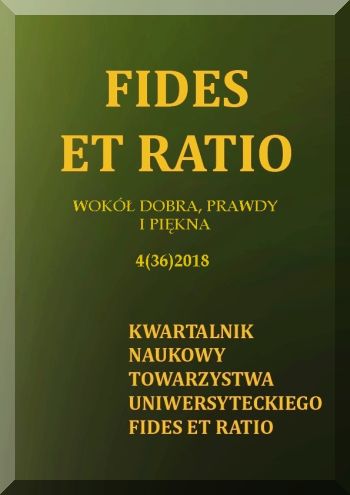Abstract
remaining under the influence of idealistic and pragmatic conceptions, while personalism (coming from theology and philosophy) was soon acquired by teist thinkers, affecting areas of both individual and public activity of the man.
Personalism was founded by Borden Parker Bowne. The movement went on to develop in two schools – Concord School of Philosophy (also known as Boston school) and Saint Louis School of Philosophy (also known as California school). The former had an individualist character, while the latter – social. Both types of personalism significantly affected practising philosophy in the USA. Analyzing two main features of personalism – pragmatism and confessiveness, it should be stated that according to this movement a human person is given the highest place in the hierarchy of all created beeings. From this fact there can be derived inalienable dignity of a human person, ultimately created by the Absolute, their subjectivity and afirmation.
American personalism is strongly integrated with christian religion, which can be especially observed in the works of Bowne. That is because on the American continent there was no radical change in philosophy, as oppposed to Europe after the French Revolution.
Presentation and analysis of major features of American personalism is to provide an insight into the matter and thus alows to depict the variety of the movement within the worldwide personalism. There also arises a question whether it is possible to create relatively consistent personalism without
a reference to the Absolute, as it happens in teist and ateist humanism in the region in question. It could be a subject of further research.
References
Abebe A.Y. (2017), Personalistyczna koncepcja teologii kultury według Czesława Stanisława Bartnika, nieopublikowana praca doktorska – Wydział Teologiczny UKSW, Warszawa.
Bartnik Cz.S. (2008), Personalizm, Lublin: KUL.
Bowne B.P. (1994), Personalizm, B. Gacka, J. Kłos (tłum.), Lublin: Oficyna Wydawnicza „Czas”.
Buczyńska-Garewicz H. (1973), James, Warszawa: Wiedza Powszechna.
Buford T. (2002), Klasyczny personalizm amerykański, Personalizm. Prawda, Dobro, Piękno, nr 3, s. 33-46.
Calkins M.W. (1930), The Philosophical Credo of an absolutistic personalist,
(w:) Contemporary American Philosophy, New York, vol. 1. s. 180-190.
Chrost S. (2015), Pedagogiczne implikacje humanizmu personalistycznego Wincentego Granata, Pedagogia Christiana, 1/35, s. 181-199.
DeWolf L.H. (2003), Historia personalizmu z perspektywy amerykańskiej, Personalizm. Prawda, Dobro, Piękno, nr 4, s. 69-92 .
Gacka B. (1996a), Personaliści amerykańscy, Lublin: Redakcja Wydawnictw KUL.
Gacka B. (1996b), Personalizm amerykański, Lublin: Redakcja Wydawnictw KUL.
Granat W. (1985), Personalizm chrześcijański. Teologia osoby ludzkiej, Poznań: Księgarnia Św. Wojciecha.
Herbut J. (1997), Leksykon Filozofii Klasycznej, Lublin: Towarzystwo Naukowe KUL.
Jastrzębski A. (2008), Pierwszy personalista amerykański; Personalizm Bordena Parkera Bowne’a, Lublin: Towarzystwo Naukowe KUL.
Kowalczyk S. (2002), Zarys filozofii człowieka, Sandomierz: Wydawnictwo Diecezjalne.
Odell S. (1938), Journals of Bronson Alcott, Boston: Little, Brown and Company.
Skakuj R.E. (2012), Szkoły personalizmu amerykańskiego: Bostońska i Kalifornijska, Pedagogika Katolicka, nr 2(11), s. 207-223.
Smolka B. (2002), Narodziny i rozwój personalizmu, Opole: Redakcja Wydawnictw Wydziału Teologicznego Uniwersytetu Opolskiego.
